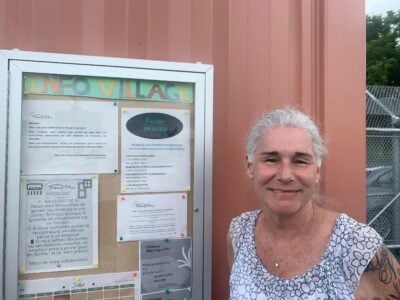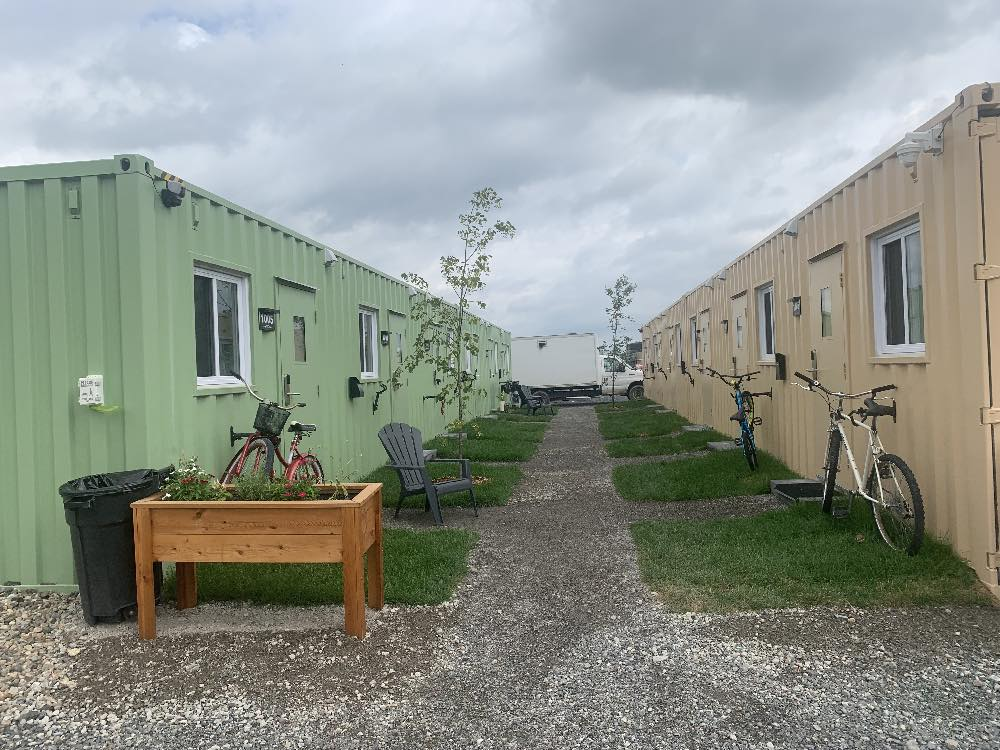There must be a better way to help people who are homeless and living in tents in winter as part of an encampment.
That was the shared view of a public-spirited developer and a dedicated Gatineau social worker.
On a cold Sunday afternoon in November of 2023 Jean-Pierre Poulin, president of Devcore Group, picked up a coffee at Tim Horton’s and went for a walk. He came upon the encampment of homeless people on the site of the old Robert Guertin Arena.

“I couldn’t believe how bad the problem had become,” he says. He bought eight more coffees and sat down to talk to the campers. “I was really touched.”
He felt that nobody was taking ownership for a serious community problem. “Why can’t we fix this?” he asked the mayor of Gatineau.
His own next step was heading up a campaign that raised $325,000 for a project to provide support to improve the lot of the campers. At first heaters, lamps, beds and chairs were provided. But it soon became clear that the problem was far more complex and was not going to work, either financially or beneficially by improving spaces in tents.
He called Nancy Martineau, a social worker of 33 years with the local CLSC (Quebec health and social services agency). “I can’t do this alone,” he told her. As part of her job, she had been checking on the welfare of the people in those tents.

When the CLSC refused her proposal to work part-time, devoting the other half to working with Poulin, she quit and went to work for Devcore. Poulin gave her the title, director of humanitarian affairs – an unusual job on the staff of a developer who owns and manages more than 3,000 housing units in Quebec and Ontario.
Working together, Martineau and Poulin eventually agreed that the “better way” would be converted shipping containers, adapted for safe and secure living as a transition out of homelessness.
Today, Village Transitiôn, a ground-breaking development on the site of the old arena, houses 38 residents who were previously in tents. Work is under way to expand the capacity to about 100.
Gatineau leased the city-owned land for 10 years to Transitiôn Quebec, a non-profit with Martineau as executive director and, for the first year, Poulin as chair. The city has a non-voting seat on the board.
The city connected all the units to water and sewer systems. Each unit has heating and air conditioning, television and internet, stainless steel sink, fridge and cupboard. Some units have a shower, others have access to a central shower room. Residents can even choose the colour of their curtains from a sample selection.
There are common laundry facilities, storage spaces, a community garden, dog park and space for bicycles. To come are a communal kitchen, a sheltered outdoor space and a centralized administration centre for services temporarily housed in units now adjacent to the entrance.
The entire “village” has been landscaped with grass and trees and is surrounded by security fencing. Security cameras are monitored in one of the administration units. Three staff members are on site 24 hours a day.
Residents must pay 25 per cent of any income if they have any (earned or from social assistance) as rent for up to five years. They are required to have an exit plan that staff can help to develop. (Three residents have already moved out to subsidized housing). And they must abide by a set of rules. They are free to come and go but visitors are allowed strictly by arrangement.
Martineau says there is a lot of drug use, so staff work to ensure safe consumption.
Users are encouraged to place a red card in their window so staff can check on them every half hour.
Steve Moran, Gatineau councillor and commissioner for supporting the homeless, says the village is a step in the right direction: “These are not homes and we can’t be satisfied with just this project.” But, he says, it is far better than living in a tent without adequate support.
Poulin says a similar project in Ottawa would be timely in view of increasing pressure on existing facilities. He has raised the subject with Mayor Mark Sutcliffe and says he is open to participating in future projects. He sees it as a cost-effective solution for other cities.
Laurent Lavallée, Gatineau’s communications director, says the village has become the largest transition project dedicated to reducing homelessness in Quebec. “Many cities have reached out to us to understand how it was made,” he says.
It was made by the initiatives of Poulin and Martineau, corporate and private donors and governments stepping up with financing. It can be done, Poulin says, “if everybody chips in.”
The total cost is $7.8 million. The Devcore Group provided a $2.3 million loan. The City of Gatineau provided $750,000 for each of the first two years, the province’s “PSL” (rent supplement program) contributes between $850,000 and $900,000 a year. And there has been verbal confirmation that Canada Mortgage and Housing Corporation (CMHC) will contribute $2.5 million through its Affordable Housing Innovation Fund.
Desjardins Financial Group has contributed $200,000, and Poulin is hoping for a much larger commitment. “Chipping in,” Poulin points to free band-width for 10 years from the Quebec Internet provider Videotron. He is hoping for free power from Hydro Quebec.
Attractive as the “village” may be, some tents still exist at the site just beyond its fenced security area. Several tent dwellers are waiting for units in the village. But a few just prefer camping – an encampment, albeit much smaller, remains.
Cities have struggled to find solutions to the encampment phenomenon. The City of Ottawa dismantled a small one in the Byward Market only to find tents popping up elsewhere.
A fire at another of Ottawa’s encampments last year highlighted the need for safe, heated transitional structures like those in Village Transitiôn.
In Toronto, there has been an encampment on land adjacent to St. Stephens-in-the-Fields Anglican Church for three years.
The City of Toronto closed it, carefully booking hotel rooms for all the tent dwellers. In time, many of the same people were back at the encampment.
Writing in The Globe and Mail, the Rev. Maggie Helwig, the rector, offered this observation: “There is a reason people may find encampments a preferable way to live (as opposed to shelters or hotel rooms)—because they offer simple human community.” They are places where people look after each other.
Village Transitiôn is less than a year old. But so far, the evidence points to success in moving homeless people out of tents, giving them that sense of support and community that will empower them to overcome challenges, heal and move to stable housing.
The Rev Maggie Helwig’s book, Encampment: Resistance, Grace and an Unhoused Community from Coach House Books is out now.
How to help support Village Transitiôn
“Together, we can make a real difference,” Village Transitiôn says in its appeal for support.
Its commitment is that 100 per cent of all donations will be invested in the maintenance and enhancement of its transitional housing and supports for its residents.
This is a promising, innovative project in the Diocese of Ottawa that is worthy of support. “Participating is one way we can put our (baptismal) promise into action,” Archdeacon Kathryn Otley says. She is a member of the Bishop’s Panel on Housing Justice and successfully oversaw the Hollyer House project at Christ Church Bells Corners.

Archdeacon Otley continues, “Homelessness in our diocese has increased 268 per cent in the last five years. We are committed to addressing this issue through education, advocacy and action. Each year, we renew our baptismal covenant. One of the promises we make is to “strive for justice and peace among all people and respect the dignity of every human.”
Not all parishes can start affordable housing projects, but they can offer support to existing projects in other parishes such as Ellwood House at St. Thomas the Apostle in Ottawa or the Community Housing Initiative Perth that St. James has spearheaded, or projects like this one. Village Transitiôn receives donations and support from other Christian denominations.
The initiative respects the dignity of people who are experiencing homelessness by offering them an opportunity to safely and securely integrate into the community. It creates supportive connections and empowers individuals by setting expectations of personal accountability, individual responsibilities and bolstering autonomy.
Village Transitiôn empowers people, providing them with immediate shelter and psychosocial supports, giving them respect and hope, assuring them they are part of a compassionate community. https://transitionquebec.org


Saint Mary’s Church, Westmeath — Deanery of the Northwest